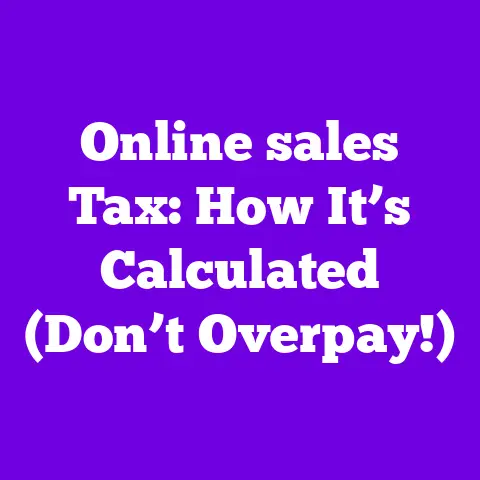When Does Bulk sales Act Apply? (Don’t Get Sued!)
How would your business survive if you suddenly found yourself on the wrong side of state regulations regarding bulk sales?
It’s a question that keeps many business owners up at night.
The Bulk Sales Act, though often overlooked, can have significant legal and financial ramifications if ignored.
In this article, I’ll break down the Act, explain when it applies, and provide practical guidance to help you navigate its complexities in 2025.
1. Understanding the Bulk Sales Act
The Bulk Sales Act, historically known as Article 6 of the Uniform Commercial Code (UCC), is designed to protect creditors when a business sells a substantial portion of its inventory or assets outside the ordinary course of business.
Essentially, it ensures that creditors have a chance to be paid before the seller disappears with the proceeds.
What’s the Purpose?
The core purpose of the Bulk Sales Act is creditor protection.
Imagine a business owner accumulating debt, then selling off all the assets and pocketing the cash, leaving creditors high and dry.
The Act aims to prevent this scenario by requiring the seller to notify creditors of the impending sale and, in some cases, ensure they receive payment from the sale proceeds.
Historical Context and Evolution
The UCC, including Article 6, was drafted in the mid-20th century to standardize commercial laws across states.
However, over time, many states repealed Article 6, finding it burdensome and ineffective in the modern business environment.
As of 2024, only a handful of states still have the Bulk Sales Act in effect.
These include:
- California
- Delaware
- Florida
- Georgia
- Maryland
- New York
- Pennsylvania
- Texas
It’s crucial to verify the current status in your specific state, as laws can change.
You can usually find this information on your state’s official legislative website or by consulting with a legal professional.
2. Key Provisions of the Bulk Sales Act
Understanding the key provisions is crucial to determining if the Act applies to your situation.
What Constitutes a “Bulk Sale?”
A bulk sale isn’t just any sale.
It’s generally defined as a sale of more than half of the seller’s inventory or assets outside the ordinary course of business.
The exact definition varies by state, but common elements include:
- Substantial Transfer: A significant portion of the business’s inventory and equipment.
- Outside the Ordinary Course of Business: Not a typical day-to-day sale.
Threshold Criteria
The Act usually applies when a certain percentage of assets are sold.
This threshold varies, but it’s often set around 50% of the inventory.
For example, California defines a bulk sale as “more than one-half of the seller’s inventory and equipment.”
Example: Let’s say you own a retail store and decide to sell off 75% of your inventory and all your display fixtures to another retailer.
This would likely trigger the Bulk Sales Act in a state where it’s in effect.
3. When Does the Bulk Sales Act Apply?
This is the million-dollar question! Let’s delve into some scenarios.
Scenarios Triggering the Act
- Selling a Business: If you’re selling your entire business, including the inventory and equipment, the Act likely applies.
- Closing a Location: If you’re closing one of several business locations and selling off all the assets at that location, this could trigger the Act, especially if it represents a significant portion of your total business assets.
- Selling a Product Line: Discontinuing a major product line and selling off the related inventory and equipment could also trigger the Act.
Examples of Transactions
Common Misconceptions
- “It’s just old inventory, so the Act doesn’t apply.” The age of the inventory doesn’t matter.
If you’re selling a substantial portion of it outside the ordinary course of business, the Act can still apply. - “I’m selling to a friend, so it’s okay.” The relationship between the buyer and seller is irrelevant.
The key is the nature of the sale. - “I’m selling below market value, so it doesn’t count.” The sale price doesn’t determine whether the Act applies.
It’s the amount of assets being transferred.
4. Legal Consequences of Non-Compliance
Ignoring the Bulk Sales Act can lead to serious legal trouble.
Potential Repercussions
- Lawsuits from Creditors: Creditors can sue to have the sale declared ineffective, meaning they can still pursue the assets in the hands of the buyer.
- Personal Liability: In some cases, the business owner can be held personally liable for the debts of the business.
- Damaged Reputation: Non-compliance can damage your business’s reputation and make it difficult to secure financing in the future.
Case Studies
While specific case details are often confidential, there are numerous instances where businesses have faced legal action for failing to comply with bulk sales laws.
For example, a restaurant owner who sold all the kitchen equipment and inventory without notifying creditors faced a lawsuit that tied up the assets for months, severely impacting the buyer’s ability to operate the business.
Importance of Due Diligence and Legal Counsel
Before any major sale, it’s critical to:
- Consult with an attorney: A lawyer can advise you on whether the Bulk Sales Act applies to your specific situation and guide you through the compliance process.
- Conduct a thorough inventory assessment: Accurately determine the value and quantity of assets being sold.
5. State-Specific Regulations
The Bulk Sales Act isn’t uniform across all states.
Here’s a look at some key differences:
Variations in State Laws
- California: California has a detailed Bulk Sales Law outlining specific notification requirements and procedures for handling creditors’ claims.
- New York: New York’s law also requires detailed notice to creditors and provides specific remedies for non-compliance.
- Repealed States: Many states, like Illinois and Pennsylvania, have repealed their Bulk Sales Acts, meaning the regulations don’t apply there.
Comparison Chart
| Feature | California | New York Disclaimer: I am an AI Chatbot and not a legal professional.
This article is for informational purposes only and not legal advice.
Consult with a qualified attorney for advice on your specific situation.
6. Best Practices for Compliance
Compliance with the Bulk Sales Act requires careful planning and execution.
Practical Steps
- Determine Applicability: First, determine if the Act applies in your state and to your specific transaction.
- Notify Creditors: If the Act applies, you must notify your creditors within the timeframe specified by law.
This notice typically includes details about the sale, such as the buyer’s name and address, the date of the sale, and a list of the assets being sold. - Prepare a Schedule of Assets and List of Creditors: Create a detailed list of all assets being sold and a complete list of creditors with their addresses and the amounts owed.
- Hold the Sale Proceeds in Escrow: In some states, you may be required to hold the sale proceeds in escrow until creditors are paid.
- Distribute Proceeds: Distribute the sale proceeds to creditors according to a predetermined schedule.
Documentation and Notifications
Proper documentation is essential.
Keep copies of all notices sent to creditors, the schedule of assets, the list of creditors, and any agreements related to the sale.
Assessing Inventory and Assets
Before the sale, conduct a thorough assessment of your inventory and assets.
This will help you determine if the sale meets the threshold requirements for the Act and ensure you accurately notify creditors.
7. Future Trends in Bulk Sales Legislation
While many states have repealed their Bulk Sales Acts, it’s important to stay informed about potential changes.
Anticipated Changes in 2025
It’s difficult to predict specific legislative changes, but several factors could influence the future of bulk sales laws:
- Economic Conditions: Economic downturns could lead to increased pressure to protect creditors, potentially prompting some states to reconsider reinstating or strengthening their Bulk Sales Acts.
- Lobbying Efforts: Creditor groups may lobby for stronger protections in states that have repealed the Act.
Impact of Emerging Technologies
- Blockchain: Blockchain technology could potentially be used to create a more transparent and secure system for tracking assets and notifying creditors of bulk sales.
This could streamline the compliance process and reduce the risk of fraud. - AI: Artificial intelligence could be used to analyze sales data and identify transactions that may trigger the Bulk Sales Act, helping businesses stay compliant.
Economic Factors and Consumer Behavior
Shifts in consumer behavior and economic factors can influence the enforcement of the Bulk Sales Act.
For example, a rise in online sales could lead to increased scrutiny of online businesses that sell off inventory without notifying creditors.
8. Conclusion
Understanding the Bulk Sales Act is essential for protecting your business from potential legal and financial liabilities.
By knowing when the Act applies, following best practices for compliance, and staying informed about regulatory changes, you can navigate the complexities of bulk sales transactions with confidence.
Remember, consulting with legal professionals and staying informed about regulatory changes is crucial.
Don’t let a lack of knowledge put your business at risk.
Ensure you’re prepared for bulk sales in 2025 and beyond.






